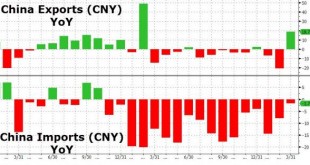There is a paradox of capitalism, we’ve reached a point where those at the top, have an unlimited budget to maintain the status quo, increase their wealth, and develop an ever increasing sophisticated toolbox to manage empire and maintain their dominance. As we explain in Splitting Pennies – this is no where more obvious than Forex. The last 100 years we’ve seen capitalism evolve brightly. Industries that shouldn’t be industries, now employ millions of workers. Paradigm shift,...
Read More »Negative Rates: Jim Bianco Warns “The Risk Of An ‘Accident’ Is Very High”
In an interesting interview with Finanz und Wirtschaft, Bianco Research president Jim Bianco discusses a variety of topics such as negative interest rates turning the entire credit process upside down, bank balance sheets being even more complex and concentrated than before the financial crisis, energy loans being an accident waiting to happen, the markets having veto power over the Fed, and gold having more room to run. * * * Mr. Bianco, negative interest are causing a lot of stir at the...
Read More »Interest Rates: How Low Can They Go?
When Denmark introduced negative interest rates in 2012, it was a pioneer. But the policy has become such an accepted part of central banks’ toolbox in the years since that financial pundits hardly batted an eyelash when Hungary became the world’s sixth central bank to introduce negative rates in March 2016. As the practice becomes more widespread, the question of how low interest rates can go has become increasingly relevant for investors. While every country (or region, in the case...
Read More »Podcast Discussing Dollar, Fed, BOJ on Futures Radio Show
I had the privilege of being interviewed by Anthony Crudele, who is trader at the CME, for the Futures Radio Show. There was much to discuss. The FOMC met yesterday. The market, judging from the Fed funds futures see little chance of a June hike. Economists think otherwise. The Bank of Japan surprised many by not changing policy earlier today. The yen rallied. It seems counter-intuitive. The yen rallied when the BOJ surprised at the end of January when it the rate on some...
Read More »FOMC Statement Demonstrates Firm Grasp of the Obvious
The FOMC delivered a statement largely as expected. It upgraded its assessment of the global economy by dropping the reference to risks. It downgraded its assessment of the domestic economy by acknowledging that growth has slowed. Otherwise is general economic assessment remains little changed. The labor market continues to improve, though growth in household spending has slowed. Housing is stronger though fixed business investment and net exports have been soft (though not as soft as...
Read More »Global Tensions Lessened, but Bound to Increase Ahead of June FOMC Meeting
We expect the FOMC statement this week to recognize the improvement in the global conditions that have been an increasing worry for officials over Q1. At the same, time the soft patch of the US economy is undeniable. We suspect the Fed will look past the weakness of the US economy. The strength of the labor market, with weekly initial jobless claims at their lowest level since 1973 and continuing claims at their lowest level since 2000, it is difficult to get too negative the US...
Read More »Risks to Global Economy Abound in 2016
The global economy struggled through a difficult year in 2015, leaving a range of challenges for policymakers hoping to avoid a third leg of the financial crisis, panelists at the Credit Suisse 2016 Asian Investment Conference (AIC) said. The Federal Reserve’s moderation in monetary tightening is crucial to sustaining fragile global economic growth in 2016, while structural reforms in China, India, and other countries are essential if struggling emerging economies are to regain their...
Read More »The Shocking Reason For FATCA… And What Comes Next
Politicians around the world are working hard to build this emerging prison planet. But it’s still possible to escape. We recently released a video to show you how. Click here to watch it now. If you’ve never heard of the Foreign Account Tax Compliance Act (FATCA), you’re not alone. Few people have, and even fewer fully grasp the terrible things it foreshadows. FATCA is a U.S. law that forces every financial institution in the world to give the IRS information about its American...
Read More »Futures Jump On Chinese Trade Data; Oil Declines; Global Stocks Turn Green For 2016
With oil losing some of its euphoric oomph overnight, following the API report of a surge in US oil inventories, and a subsequent report that Iran's oil minister would skip the Doha OPEC meeting altogether, the global stock rally needed another catalyst to maintain the levitation. It got that courtesy of the return of USDJPY levitation, which has pushed the pair back above 109, the highest in over a week, as well as a boost in sentiment from the previously reported Chinese trade data where...
Read More »Helicopter Drops of Money
In his blog, Ben Bernanke discusses the merits of “helicopter drops” as a monetary policy tool. [A] “helicopter drop” of money is an expansionary fiscal policy—an increase in public spending or a tax cut—financed by a permanent increase in the money stock. … the Fed credits the Treasury … in the Treasury’s “checking account” at the central bank, and those funds are used to pay for the new spending and the tax rebate. … it should influence the economy through a number of channels, making it...
Read More » Swiss Economicblogs.org
Swiss Economicblogs.org






